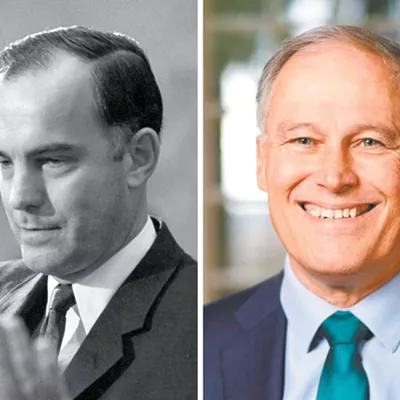
The three people running to represent Washington's 3rd Legislative District are familiar political faces in Spokane politics.
Ben Stuckart, a Democrat, served as Spokane City Council president from 2012 to 2019, when he ran for mayor and lost to Nadine Woodward by just over 1 percentage point. He's now director of the Spokane Low Income Housing Consortium.
The other Democrat in the race, Natasha Hill, is a lawyer and longtime community activist who unsuccessfully challenged Republican U.S. Rep. Cathy McMorris Rodgers for her congressional seat in 2022.
The only Republican vying for the seat this year is Tony Kiepe, an insurance professional who unsuccessfully ran for Spokane City Council in 2017 and 2019.
The three are running to fill the 3rd District's House Position 1, which covers much of the city of Spokane and is being vacated by Rep. Marcus Riccelli, a Democrat who's running unopposed for state Senate. The two who receive the most votes will advance past the Aug. 6 primary election.
"Marcus has done a great job representing the 3rd — I don't know if there's a single thing he's done that I disagree with," Stuckart says.
Hill also says she thinks Riccelli has done well, especially on health care. As a woman of color, she thinks she can bring a fresh perspective to the seat.
Kiepe, on the other hand, says he's been frustrated with Riccelli and other Democrats' tenure in Olympia.
The 3rd District leans solidly blue and has a very long history of electing Democrats. Regardless, Kiepe is hopeful that frustration over gas prices and inflation will prompt voters to switch things up this year. Stuckart and Hill, for their part, appear focused on defeating each other.
SPEAKING THEIR MINDS
Stuckart and Hill have a lot in common. The two progressive firebrands grew up in Spokane, and have been involved in numerous nonprofits and community advocacy organizations. They also share a reputation for speaking their minds on controversial issues — even if it might mean alienating potential allies.Stuckart acknowledges getting "a reputation as being a little hotheaded" as City Council president. He recalls angry press conferences, abruptly gaveling a meeting closed and clashing with fellow council members.
"Sometimes I flew off the handle," Stuckart says. "Maybe justified, but it didn't come across good."
But Stuckart says he's changed in recent years.
"I've taken a much calmer approach to everything in my life," Stuckart says. "I think I've been more levelheaded... I'm not courting controversy, even though I still speak my mind. I think I've learned a lot. I matured."
Stuckart says the 2019 mayoral election defeat prompted his shift in temperament.
"When you lose a citywide election, it crushes your self-worth, it really makes you think," Stuckart says. "You do a lot of listening and self-reflection."
For example, Stuckart points to his relationship with former City Council member Kate Burke. The two "butted heads quite publicly" while serving on the council together, but since leaving, Stuckart says they've gotten coffee many times and reconciled many of their differences.
In a text, Burke says she and Stuckart made amends and now work well together. She's now endorsing his campaign.
Hill says she's heard people say she and Stuckart share a reputation for being outspoken.
"I think that's actually true," Hill says. "You're definitely going to know where we stand on things."
Last month, Hill was involved in a heated confrontation outside the Spokane County Democrats booth at the Pride month celebrations in Riverfront Park. The Spokesman-Review reported that some witnesses said Hill was yelling disparaging remarks about Stuckart, who was not present, and made accusations of racism when party members tried to get her to stop and threatened to call security.
Hill says she was only trying to highlight policy differences between her and her opponent.
"There was definitely a difference of opinion," Hill says.
The Spokane County Democrats, which endorsed both candidates, opened an investigation into the incident. Hill's sister, Lacrecia "Lu" Hill, resigned from the party in protest.
"I think the Democratic Party has an idea of what a candidate is supposed to look like and supposed to act like, and I don't fit in their boxes," Natasha Hill says. "Probably because I'm not a middle class white dude."
Kiepe doesn't shy away from speaking his mind either. During his run for City Council in 2019, he told the Inlander that he supports the idea of Eastern Washington splitting off into its own "Liberty" state — a controversial right-wing idea popularized by former state Rep. Matt Shea.
Kiepe says he hasn't paid much attention to the proposal in recent years, but that if it came up again he would probably support it.
"We have different values, different morals on the east side," Kiepe says.
HOUSING
All three candidates say affordable housing is a top priority. When it comes to increasing supply, they broadly agree that Spokane needs greater density.Stuckart thinks the state needs to hold cities that fail to meet state density goals more accountable. He supports a failed bill from a previous session that would have penalized cities that resist the state's goal of loosening single-family zoning to allow more dense, affordable housing.
Stuckart knows that's a controversial view — he's had supporters argue with him about it on Facebook.
"It's not popular with [cities] and counties because they want local control," Stuckart says.
Regardless, Stuckart says the current situation — where low vacancy rates and inventory drive up rents and force people into homelessness — isn't sustainable, and that state government needs to make reluctant cities get on board with growth. He also supports funding more subsidized housing through increased real estate excise taxes.
Kiepe says he supports density and growth, but doesn't think the state should override local control.
"I believe the city government should have their own decisions on what they want to do," Kiepe says. "I believe in less government."
Hill says the state has a role in getting cities on board with density, but that there has to be a collaboration, as cities have closer connections to people in the building industry.
Hill supports some form of permanent rent control at the state level to prevent people from being priced out of their homes.
"We also have to be looking out for landlords," Hill says. "It's two sides of the same coin where everybody is looking to make sure that we have a strong market that's affordable and doesn't push people outside of neighborhoods."
Stuckart thinks rent control can be a good short-term solution but doesn't want it to be permanent. He says two-thirds of studies cited in a recent Journal of Housing Economics review found that permanent rent control can reduce housing supply.
"In the long term you're harming the supply of housing, you're making the problem worse," Stuckart says. "Maybe it can be in place for a couple of years, but there needs to be detailed reporting done."
Stuckart says he's also interested in a "best use" tax to encourage development of vacant lots downtown.
PUBLIC SAFETY AND TAXES
On public safety, Kiepe is especially critical of a 2021 state law that restricted officers' ability to conduct vehicle chases.The Legislature reversed elements of the law this March in response to a Republican-backed citizen initiative. Kiepe says he's glad "our policemen can chase criminals once again."
Asked about other ways to make it easier for police to do their jobs, Kiepe says he needs to look into it more. But overall, his goal is to "untie their hands" and ensure they can enforce the law.
At a Black Lives Matter rally in 2020, Hill described police as being "complicit in the worst gang this country has ever seen," and called for them to be defunded.
Today, Hill stresses that the phrasing of "defund the police" is intentional on the part of Black Lives Matter to get people's attention.
"It's not abolition. Nobody is saying we don't need some level of law enforcement," Hill says. "What we need to look at is budgets... I think we have to really focus on what we need law enforcement for, what their purpose is."
Stuckart and Hill both support a "root causes" approach to public safety and policing. Fixing the mental health and substance use disorder systems with more treatment beds and more trained responders would help unburden officers who aren't trained to respond to those issues, Stuckart and Hill say, adding that jail can't be the only solution.
In order to fully fund the mental health and addiction programs he's advocating for, Stuckart thinks Washington's tax system needs an overhaul.
"Our regressive tax structure is causing income inequality, which drives conflict and crime," Stuckart says.
He notes that he's already talking with "people I'm going to potentially work with" in Olympia about creating a tax on people who own over $250 million in property. The tax could raise $2 billion to $3 billion per year, Stuckart says.
Hill says she also supports a wealth tax and strengthening the state's capital gains tax.
In Washington, cities aren't allowed to raise property taxes by more than 1% per year without going to voters for approval. Last year, Spokane joined the Association of Washington Cities in asking the state to raise the "arbitrary" limit to 3%, though it wasn't changed.
Stuckart supports raising the cap. It would give cities flexibility to respond in the event of a public safety crisis or other unexpected expense, he says, and if citizens don't like it, they still have the option to vote out elected leaders who raise the tax.
"Putting an artificial barrier in front of cities isn't fair," Stuckart says.
Kiepe doesn't support raising the cap. He says the government already spends too much and cities should "learn to live within their means."
Hill says she wants to look at the property tax issue closer before deciding. "It depends on the properties we're talking about," she says.
CAMPAIGN TRAIL
As campaign season heats up, all three candidates are busy.Last week, as temperatures soared above 100, Kiepe was out campaigning. If there's one thing his previous campaigns taught him, it's "doorbell, doorbell, doorbell," he says. Even during heatwaves.
"You hit 10, 15 doors, and next thing you know you're soaking wet," Kiepe says with a laugh. "But I'll tell you, the response has been phenomenal."
Last Thursday evening, Hill held a campaign meet-and-greet at Indigenous Eats inside River Park Square mall.
The restaurant is owned by Jenny Slagle, who has endorsed Hill's campaign and is vice president of the Spokane Public Schools Board. Hill says she got to know Slagle through the Every Student Counts Alliance, an advocacy group that Hill worked with to "dismantle the school to prison pipeline" and create a "student to success pipeline."
Across town, Stuckart was speaking at a fundraiser in northwest Spokane hosted by members of the Spokane Firefighters Union, Local 29, which has endorsed him.
"I could probably just spend the speech talking about all the ways the fire department got hosed under [former Mayor David] Condon," Stuckart said, prompting laughter from the crowd.
Stuckart leads in fundraising, with $92,402 in total contributions reported to the state's Public Disclosure Commission. Hill has reported $57,465 in contributions. Kiepe has $7,307 in reported contributions but says he's hopeful that will turn around after the primary.
"It's very hard to raise money right now because a Republican hasn't won in a long time," Kiepe says. "People said, 'We want to see how you do in the primary.'" ♦
























